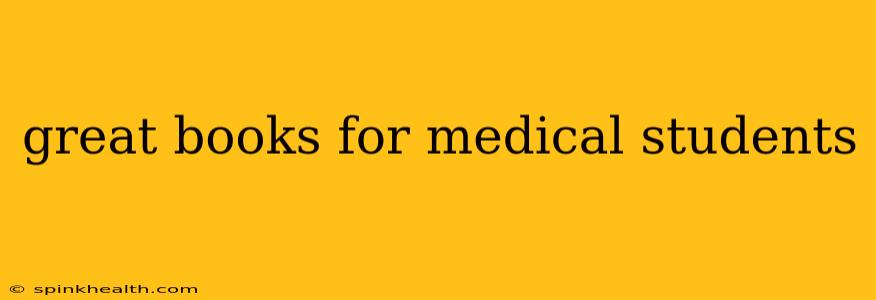Great Books for Medical Students: A Journey Through the Years
The journey of a medical student is a marathon, not a sprint. It's a demanding, exhilarating, and often overwhelming experience filled with countless hours of study, clinical rotations, and the weight of immense responsibility. Navigating this path requires more than just textbooks; it necessitates a strategic selection of reading materials that offer both knowledge and perspective. This isn't just about acing exams; it's about cultivating a deep understanding of medicine and developing the essential skills to become a compassionate and competent physician.
My name is Dr. Eleanor Vance, and I've been guiding medical students for over a decade. I've witnessed firsthand the impact of well-chosen reading materials on their academic success and overall well-being. This guide reflects my experience and incorporates valuable feedback from students I've mentored.
Essential Textbooks: The Foundation of Medical Knowledge
Let's begin with the bedrock of any medical student's library: the core textbooks. While specific titles may vary depending on your curriculum, certain publishers and authors consistently produce high-quality, comprehensive resources. These aren't just books to skim; they're resources you'll likely reference throughout your career.
- Anatomy: Gray's Anatomy remains the gold standard, renowned for its detailed illustrations and comprehensive coverage. However, consider newer, more concise versions if you find Gray's overwhelming. Look for options that complement your learning style - some prefer visually rich atlases, while others benefit from more textual explanations.
- Physiology: Guyton and Hall Textbook of Medical Physiology is a comprehensive classic, but again, consider alternatives if you need a less dense text. Understanding physiology is critical for grasping the underlying mechanisms of disease.
- Biochemistry: Lippincott's Illustrated Reviews: Biochemistry is a popular choice, known for its clear explanations and visually engaging format. Biochemistry can seem daunting, but a well-structured textbook can make the learning process significantly more manageable.
- Pharmacology: Katzung & Trevor's Pharmacology Examination and Board Review is a highly regarded resource for understanding drug mechanisms and clinical applications. Mastering pharmacology is vital for safe and effective patient care.
- Pathology: Robbins and Cotran Pathologic Basis of Disease is a comprehensive and visually rich resource, providing a strong foundation in the mechanisms and manifestations of disease. Understanding pathology is essential for accurate diagnosis and treatment.
Beyond Textbooks: Broadening Your Medical Perspective
While textbooks are essential, they often lack the nuanced perspectives crucial for holistic patient care. Expanding your reading to include the following categories can enrich your learning experience and foster a more well-rounded understanding of medicine.
H2: What are some good books for medical students to improve their clinical skills?
Improving clinical skills is a gradual process that combines theoretical knowledge with practical application. While textbooks provide the foundational knowledge, honing clinical skills requires observing experienced clinicians, actively participating in patient care, and engaging with resources that focus on practical application. Books focusing on clinical reasoning, communication skills, and physical examination techniques are invaluable. Look for books that offer case studies and practical advice from experienced clinicians. These resources can bridge the gap between theoretical knowledge and real-world practice, enabling medical students to confidently approach patient interactions and build their diagnostic and treatment capabilities.
H2: What are some good books for medical students to prepare for the USMLE Step 1?
The USMLE Step 1 exam is a significant hurdle in the medical student journey. Preparation requires a structured approach, combining focused review of core concepts with practice questions. While specific resources may depend on individual learning styles, First Aid for the USMLE Step 1 is a widely used and respected resource known for its concise summaries of key information. Supplementing First Aid with question banks, such as UWorld, can be particularly effective in identifying knowledge gaps and improving test-taking strategies. Remember, consistent study and practice are key to success on this challenging examination.
H2: How can I improve my medical knowledge outside of lectures and textbooks?
Supplementing your formal medical education is crucial for continuous growth. Medical journals such as the New England Journal of Medicine (NEJM) and the Lancet provide insights into current research and clinical advancements. Engaging with these publications exposes you to cutting-edge developments, expanding your knowledge beyond the curriculum. Furthermore, attending medical conferences and workshops can offer invaluable opportunities to learn from experts, network with peers, and gain exposure to diverse medical perspectives. Active participation in these events creates opportunities for continued learning and skill development.
H2: What are some helpful resources for medical students dealing with stress and burnout?
The demanding nature of medical education often leads to significant stress and potential burnout. Recognizing this, many resources are available to support students' well-being. These resources can range from books focusing on stress management techniques and self-care strategies to peer support groups and counseling services. Prioritizing mental well-being is paramount to navigating the challenges of medical training and maintaining a healthy, balanced lifestyle throughout your career.
The journey of a medical student is a unique and deeply personal one. This list is a starting point, a guide to help you navigate the vast sea of medical literature and find the resources that best serve your individual needs and learning style. Remember to prioritize your well-being throughout this journey. Good luck!

